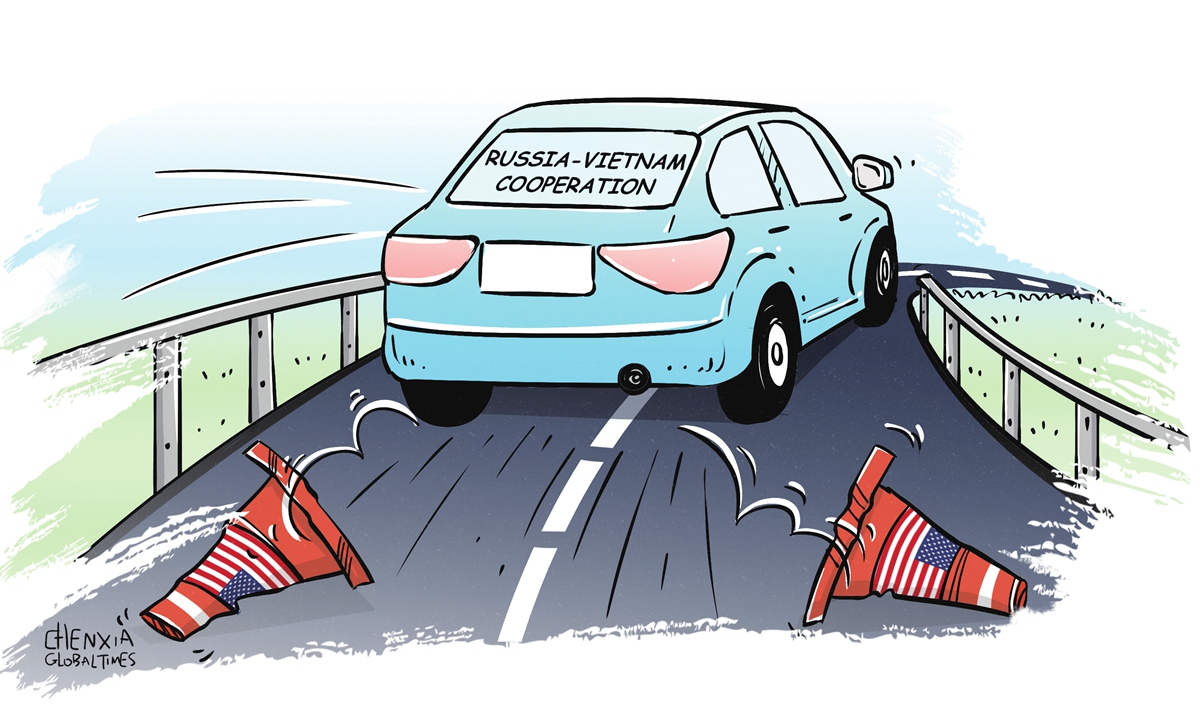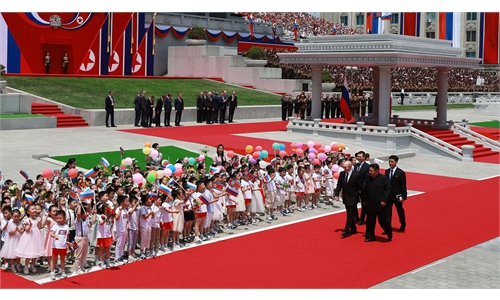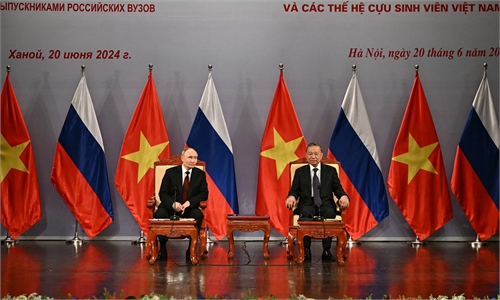
Illustration: Chen Xia/GT
Russian President Vladimir Putin has embarked on his Eastern tour, arriving in Hanoi, Vietnam on Thursday after visiting North Korea. This marks Putin's first state visit to Vietnam since 2017 and his fifth visit to the country overall. During his visit to Hanoi, Putin held talks with General Secretary of the Communist Party of Vietnam, Nguyen Phu Trong, Vietnam's new President To Lam and other leaders. This development is not welcome news for the US, which elevated its relationship with Vietnam to a comprehensive strategic partnership last year and has been one of Vietnam's most important trade partners in recent years.
A spokesperson for the US Embassy in Vietnam expressed dissatisfaction to Reuters, stating, "No country should give Putin a platform to promote his war of aggression." The spokesperson added, "If he is able to travel freely, it could normalize Russia's blatant violations of international law." While Putin was still in Hanoi, Washington announced that its top diplomat for East Asia, Daniel Kritenbrink, would visit Vietnam on Friday and Saturday to stress Washington's commitment to working with Hanoi to ensure a "free and open" Indo-Pacific region.
From the US perspective, Vietnam's actions facilitate Russia's diplomatic breakthrough in Southeast Asia.
Washington's "frustration" stems from three misjudgments. The first is its misjudgment of Vietnam's "bamboo diplomacy." Since the implementation of its renovation policy in the 1980s, Vietnam has gradually established and adhered to a policy of multilateral and diverse diplomacy. Vietnam wants to develop equal and friendly relations with countries around the world, including major world powers. It believes that relying on a single major power is not only unhelpful but may also harm its national interests. Adhering to this philosophy, Vietnam has established comprehensive strategic partnerships with major powers such as China, the US, Japan, Russia and India. Nguyen Phu Trong has been actively promoting Vietnam's "bamboo diplomacy," which is characterized by flexibility yet grounded in solid principles. Strengthening and developing relations with Russia is a natural step in Vietnam's pursuit of multilateral and diverse diplomacy, and it is a sovereign right of Vietnam that should not be interfered with by the US or any other country.
The second is its misjudgment of the traditional basis and close cooperation in Russia-Vietnam relations. During the Cold War, Vietnam maintained close political, economic and military relations with the Soviet Union. After the Cold War, Vietnam continued to maintain close cooperation with Russia. Defense cooperation between Russia and Vietnam has formed a certain tradition and scale. Although the Vietnamese People's Army has been diversifying its sources of weapons, the majority of its equipment is still supplied by Russia. Vietnam is also an important partner of the Eurasian Economic Union (EAEU) promoted by Russia, having signed a free trade agreement with the EAEU in 2015. Cooperation between Russia and Vietnam in trade, investment, technology and energy is very close and has great potential for further growth. Vietnamese President To Lam and his Russian counterpart Putin on Thursday witnessed the signing ceremony of 11 cooperation documents between the two countries. Therefore, even though the US has been Vietnam's top export destination for several years, US-Vietnam relations cannot replace Russia-Vietnam relations in the present or foreseeable future.
The third is the US' misjudgment of US influence over Vietnam and other small- and medium-sized countries. As the world's only superpower, the US presence and influence in the international system are undeniable. However, the US cannot ignore the core interests and concerns of small- and medium-sized countries, including Vietnam, or the independence of their foreign and security policies.
Vietnam remains highly vigilant against attempts by certain political forces in the US and other Western countries to interfere in its internal affairs under the guise of human rights, democracy and religion, as well as plots to incite "peaceful evolution" in Vietnam. Vietnam's Ministry of Foreign Affairs has repeatedly expressed strong dissatisfaction with US statements and actions regarding the country. Despite the continuous warming of US-Vietnam relations in recent years, the US cannot arbitrarily interfere in Vietnam's internal affairs or dictate its foreign policy on them.
Against the backdrop of the Russia-Ukraine conflict, Vietnam did not attend the Ukraine peace summit in Switzerland last weekend, but earlier last week, it sent a deputy foreign minister to attend a BRICS meeting in Russia. This also reflects Vietnam's refusal to bow to Western pressure.
All indications suggest that the continued deepening of US-Vietnam relations still faces bottlenecks. Washington must handle US-Vietnam relations with great caution. It is foreseeable that, given Vietnam's significant role in the US-promoted "Indo-Pacific Strategy," the US is likely to refrain from taking severe punitive measures against Vietnam, despite its displeasure with Vietnam's grand reception of Putin and the continued advancement of Russia-Vietnam cooperation.
The author is a research fellow at the National Institute of International Strategy at the Chinese Academy of Social Sciences. opinion@globaltimes.com.cn


